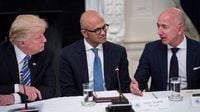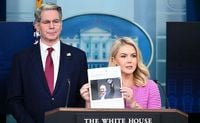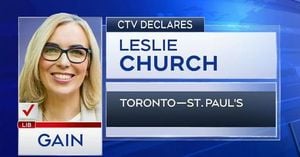The White House took aggressive aim at Amazon on Tuesday, April 29, 2025, following reports that the e-commerce giant was considering displaying the additional costs associated with President Donald Trump’s tariffs on its product listings. This potential move would have illustrated to American consumers how tariffs affect the prices they pay, but the company quickly denied any plans to implement such a feature.
President Trump personally called Amazon founder Jeff Bezos to express his discontent over the situation. "Jeff Bezos was very nice. He was terrific," Trump told reporters after their conversation, adding that Bezos "solved the problem very quickly." However, the White House's initial reaction was far from conciliatory. White House Press Secretary Karoline Leavitt labeled Amazon's consideration a "hostile and political act," claiming it would unfairly shift the burden of tariffs onto consumers.
According to reports from Punchbowl News, Amazon was contemplating listing how much of an item’s cost was derived from tariffs right next to the total price on its main website. This would have highlighted to consumers that U.S. tariffs are borne by American companies and passed on to customers, rather than being absorbed by foreign manufacturers. The tariffs in question include a staggering 145% on imports from China and a 10% minimum tax on all other countries.
After the White House's public outcry, Amazon quickly issued a statement clarifying that the idea of displaying tariff costs was never approved for its main site. Instead, the company had merely considered the option for its spinoff site, Amazon Haul, which specializes in selling items under $20. "This was never approved and is not going to happen," said Amazon spokesperson Tim Doyle.
Despite Amazon's retraction, the political implications of the proposed change are significant. Senate Minority Leader Chuck Schumer, for instance, encouraged businesses to show customers how tariffs impact their finances. "To the large businesses that sell to consumers, I say show your customers how much tariffs are hurting in their pocketbook. People deserve to know the impact tariffs have on their finances," Schumer stated on the Senate floor.
Leavitt’s comments included a reference to a 2021 Reuters report that alleged Amazon had partnered with a "Chinese propaganda arm" to censor user reviews on its Chinese website. She argued that this history further justified the need for American consumers to support domestic products. "It’s another reason why we are onshoring critical supply chains here at home, to shore up our own critical supply chain and boost our own manufacturing here," she claimed.
Bezos has been working to cultivate a more amicable relationship with Trump since the president’s election. Amazon donated $1 million to Trump’s inaugural fund and has been involved in various initiatives that align with the administration's goals. However, Bezos' net worth has declined by $30 billion since the start of 2025, largely attributed to Trump's tariff policies and a downturn in the stock market.
Trump's tariff policies have sparked significant controversy, with critics arguing that they disproportionately affect consumers and small businesses that rely on imported goods. The tariffs have led to increased prices for many products, raising concerns about inflation and economic stability. A recent Reuters/Ipsos poll indicated that only 37% of Americans approve of Trump’s handling of the economy, a decline from 42% in January.
During the press briefing, Leavitt questioned why Amazon had not taken similar actions during the Biden administration, which she claimed had contributed to inflation reaching its highest level in 40 years. "Why didn’t Amazon do this when the Biden administration hiked inflation to the highest level in 40 years?" she asked, suggesting a selective approach to transparency regarding pricing.
While Amazon has distanced itself from the idea of displaying tariff costs, other e-commerce platforms like Shein and Temu have already adjusted their pricing structures in response to the tariffs. Temu, for instance, has introduced a new import charge that is displayed at checkout, indicating that the effects of tariffs are being felt across the industry.
The ongoing tensions between Trump and Bezos highlight the broader implications of the administration's trade policies and their impact on major corporations. As Trump continues to negotiate with various countries regarding trade agreements, the uncertainty surrounding tariffs remains a significant concern for both consumers and businesses alike.
In the wake of this incident, Amazon's stock experienced a brief decline of more than 2% before stabilizing. The company is set to report its earnings for the first quarter of 2025 on May 1, 2025, amid these ongoing tensions.
As the political landscape continues to evolve, the relationship between major corporations and government policies will likely remain a focal point of discussion, particularly as consumers feel the effects of tariffs in their everyday lives.






